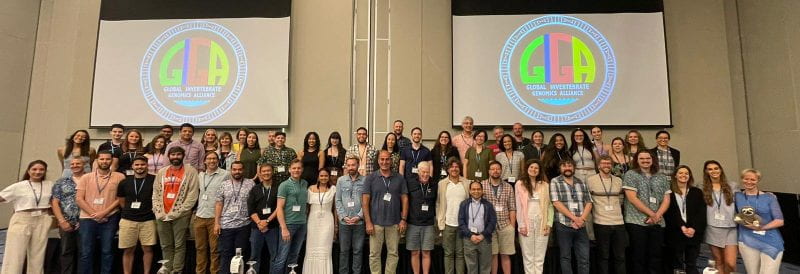Halmos Faculty, Student Participate in International Conference

 What is “cold, clammy and wet all over?” Answer: most marine invertebrates. Apart from corals, which build reefs, many marine invertebrates are often overlooked because they are not so “warm and fuzzy” like their charismatic, terrestrial counterparts. As a group, invertebrates number in the thousands. Although generally classified by not having backbones (vertebrate spines), most invertebrates still have complex body parts, including neurons and sensory systems. Indeed, several invertebrate species appear to be highly intelligent – e.g. octopus and cuttlefish show the capacity to learn and appear to have sophisticated neural structures.
What is “cold, clammy and wet all over?” Answer: most marine invertebrates. Apart from corals, which build reefs, many marine invertebrates are often overlooked because they are not so “warm and fuzzy” like their charismatic, terrestrial counterparts. As a group, invertebrates number in the thousands. Although generally classified by not having backbones (vertebrate spines), most invertebrates still have complex body parts, including neurons and sensory systems. Indeed, several invertebrate species appear to be highly intelligent – e.g. octopus and cuttlefish show the capacity to learn and appear to have sophisticated neural structures.
To illuminate more about the life and hereditary material (genomes) of these vital marine animals, the non-profit organization GIGA (for the Global invertebrate Genomics Alliance) was formed in 2013. HCAS professor Jose V. Lopez, Ph.D., along with many academic colleagues from around world, co-founded the organization. Lopez said, “a primary goal of GIGA is to promote invertebrate research and also expand training and education in the complex fields of bioinformatics and genomics.” Lopez served as a panel chair and gave a presentation titled, “Characterizing Whole Genomes from Photosymbiotic Organisms and Sponges: Updates from the Aquatic Symbiosis Genome (ASG) Project.”
In this context, the fifth GIGA conference was held in Cartagena, Colombia Oct 31 – Nov 3, 2023, held true to many of the core goals of the society. The conference was held at the scenic oceanside Intercontinental Hotel along with an optional dive excursion to the nearby Rosario Islands, possessing extensive coral reefs. By obtaining sponsorships from various quarters such as the Moore Foundation, the American Genetics Association, the UK’s Sanger Institute, and PacBio Inc, GIGA provided travel sponsorships to at least a dozen Global South students from Colombia, Brazil, Chile, and Peru. Students and early career researchers had several opportunities to present their research through lightning talks and a poster session. For example, NSU Department of Biological Sciences MS student Rachel Bacaner working in Dr. Lopez’s laboratory presented a poster on Caribbean octocoral Antillogorgia americana cell cultures. Major themes of the sessions included marine symbiosis (coral and algae) and characterizing biodiversity at the molecular level and professional development.
Over 65 students, faculty and researchers composed the GIGA V attendees representing eight different countries. The list of talks spanned detailed descriptions of individual species genomes from giant clams to golden mussels, technical talks on how to best analyze volumes of Big Sequence Data and the effects of climate change. Attendees also heard unique talks describing JEDI (Justice, Equity, Diversity, and Inclusion) within the genomics sciences and the future of scientific publishing in the era of open access and artificial intelligence by Laurie Goodman (Giga Science). Determining the whole genome sequences of non-model organisms, such as many invertebrates, contributes to their conservation and a better understanding of their evolution and ecosystem health.
For more information please see: http://www.gigacos.org/index.php/meetings/giga_v/
Posted 12/10/23